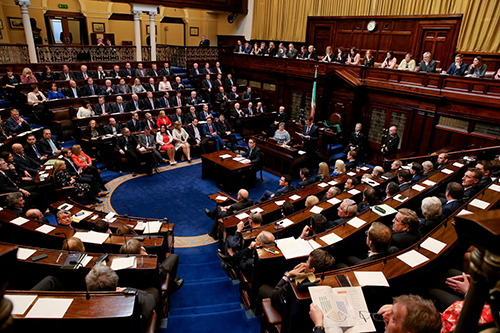15 February 2019 – On 14 February 2019, Maureen O’Sullivan TD and Niall Collins TD held a topical issue debate concerning the deteriorating human rights situation in Bahrain in Ireland’s Dáil Éireann. The debate came on the eighth anniversary of the 2011 pro-democracy movement and protests, which were met with a violent government crackdown that has been ongoing ever since. Americans for Democracy & Human Rights in Bahrain (ADHRB) welcomes this debate on the anniversary of 14 February as the human rights situation in Bahrain continues to deteriorate eight years on.
O’Sullivan TD highlighted the crackdown following the 2011 mass pro-democracy demonstrations, noting that in the aftermath of the protests, the government targeted human rights defenders, teachers, doctors, scholars, and broader civil society activists. Eight years on, the government has continued its abuses, torturing and forcibly disappearing individuals, while utilizing the death penalty and giving police and military officers the greenlight to use violence against protestors. Despite this, no senior officials have been held accountable for their brutality or torture. Both Jau Prison and Isa Town Women’s Center violate the United Nation’s minimum rules for the treatment of prisoners, denying prisoners access to medication and medical care, family visitation rights, and subjecting prisoners to inhumane searches. The cases of Hajer Mansoor, Najah Yusuf, and Medina Ali demonstrate this lack of accountability in Bahraini prisons.
Despite evidence of rights abuses, the Irish Royal College of Surgeon’s maintains a close relationship with Bahrain’s King Hamad University hospital, calling into question whether or not the college is living up to its ethical and moral standards. Ireland’s Foreign Minister Simon Coveney has been in correspondence with O’Sullivan TD regarding these concerns, including the failure of oversight mechanisms such as the Bahrain Ministry of Interior Ombudsman and Public Prosecution’s Office to remain independent and impartial. O’Sullivan TD’s remarks closed with a call for Ireland to go further in advocating for human rights with the Bahraini government.
Niall Collins TD followed with insight into the Bahraini government’s closure of civil and political society space. Since 2011, the Government of Bahrain has increasingly sought to silence dissenting voices, closing the country’s only independent newspaper Al-Wasat in 2017. The government has further targeted political opposition, dissolving political opposition societies and going so far as to sentence al-Wefaq’s Secretary-General Sheikh Ali Salman and others to life in prison. These rulings have attracted criticism from the European Union (EU), which deemed these actions “a further step against dissenting voice.” Critics of government policy have been arrested, tortured, interrogated, and arbitrarily detained for dissent, including human rights defenders.
Despite evidence of political repression, the November 2018 parliamentary elections were held without independent oversight, resulting in elections that were neither free, fair, nor representative of Bahrainis. Given these circumstances, Bahrain’s recent election to a seat at the Human Rights Council (HRC) raises serious questions as to the Council’s membership standards. In light of this, Collins TD recommended that Ireland take leadership at the 40th session of the HRC by issuing a statement condemning the actions of the Bahraini authorities ahead of the Council and to continue raising concerns for its abuses, which O’Sullivan TD echoed. Collins TD further urged the Irish government to call for a moratorium on Bahrain’s use of the death penalty, reform of the kingdom’s oversight mechanisms, and the right to free expression and freedom of political prisoners.
With these concerns and calls highlighted, Minister of State at the Department of Foreign Affairs and Trade, Helen McEntee TD, addressed the most serious issues raised by the TDs, including abuse of prisoners, torture, restrictions of free expression, and the closure of civil and political society. The Department of Foreign Affairs and Trade is actively engaging with Bahrain and its London embassy on such issues, while at the same time closely monitoring Sheikh Ali Salman’s case and a myriad of abuses ranging from restrictions to free expression, detainees, the death peanlty and reprisal. In light of these abuses, Ireland has stayed engaged on Bahrain in the HRC and has raised Bahrain in its past eight statements at the Council. However, despite the department and Ireland’s multilateral engagement with Bahrain, abuse remains rampant and the kingdom has not acted in accordance with its commitments to Ireland to implement human rights reform. Though Ireland-Bahrain relations must remain positive, McEntee TD emphasized this is relationship must not be at the expense of engagement on human rights. McEntee TD reaffirmed that the department intends on continuing to engage with Bahrain on its human rights abuses in the Council and in diplomacy, further assuring that the Irish would continue to call for a moratorium on the death penalty.
ADHRB welcomes the critical national engagement of the Irish Dáil Éireann on matters of human rights in Bahrain and thanks O’Sullivan TD and Collins TD for raising serious concerns for the current state of political and civil society, police brutality, prisoner’s rights and startling lack of accountability for rights abuses. We echo the TDs’ calls for increased Irish engagement at the Council and urge Ireland maintain exemplary leadership and raise the human rights situation in Bahrain at the upcoming 40th session of the HRC.





